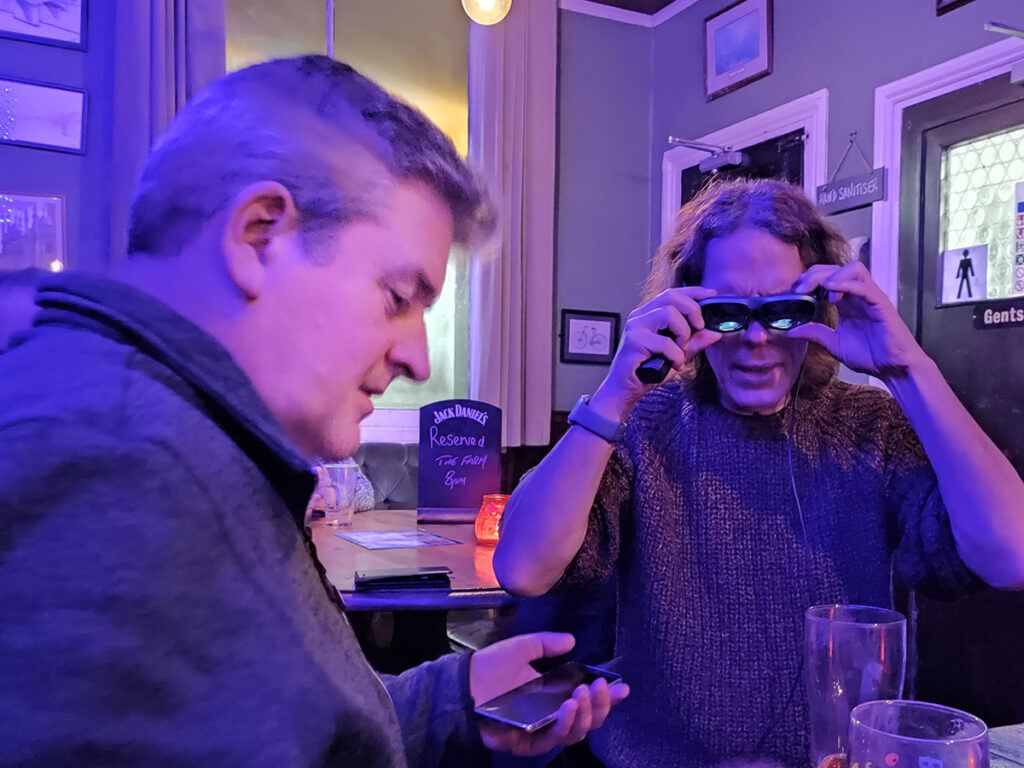Rokit AR demo, LLM use and ethics, and more – meeting notes from 28th Feb
Posted by Paul Silver

On Wednesday 28th February, 2024, ten freelancers met in the Battle of Trafalgar, Brighton, to talk freelancing and tech.
This is some of what was talked about:
- Science fiction books and films
- The Apple Vision Pro
- A break in Thailand
- Oliver Sacks
- Reaction videos – the good and the bad
- Watching easy media when you’re tired
- “If you’re so smart, why is your life such a mess?”
- Xcode iOS simulator vs testing on a real iPhone – frustrating differences
- Unity vs A-Frame
- HTMX
- Different styles of PHP: Magento vs Symfony vs Laravel
- Learning programming
- Tier One for good refurb computers
- Cutting down smoking via vape adjustments
- “I’m becoming a command line zealot”
- The good and the bad of LLMs
- Rokit AR glasses demo
- Having an old body
- Hired EV frustrations
Highlights
Xcode iOS simulator vs a real iPhone
If you use a Mac computer, the free Xcode tools come with an iOS simulator. It lets you choose from a range of iOS devices and starts a virtual one so you an test a website or app on it.
This is great for testing websites, until you discover that actually, the version of Safari in the iPhone in the simulator is different from the one in real life iPhones.
This annoying nugget of information is one that people who do a lot of front end development know, but it doesn’t get talked about enough that I come across it. Fortunately, I found out a while ago and the topic came up this week as I hit a problem that I wasn’t sure was solved only using the simulator and another Farm member helped me out by testing it on their phone (thanks Hazlitt.) If you’re relying on the iOS simulator, don’t!
Rokit AR glasses demonstrations
After the talk about them last week, Hazlitt brought his Rokit AR glasses along so people could try them out. Pictured is Sky trying them out with Hazlitt’s Android phone in desktop mode.

The good and the bad of LLMs
The use of Large Language Models (LLMs), AKA “AI” came up in conversation again this week. It is a heavily reoccurring topic across 2023 and 2024.
Some Farm members have used LLMs to help with their code, the most popular being Chat-GPT and in a distant second place, Copilot. We’ve found it particularly helpful to either spit out standard code that you need a lot of, or to give you a place to start in a language that’s only semi-familiar. I hadn’t used an LLM to do any coding until a recent project where I was having problems with some Javascript and I couldn’t find a decent example by Googling. Chat-GPT gave me a useful example with the minimum of effort and I then expanded it to fit my exact needs, and I used for another example a few days later.
I don’t think I’d want to use a LLM for a programming language I’m completely unfamiliar with as even in my limited use, it used more than one coding style and produced some code that would never have worked in a project. However, I can see how people find them useful.
Jules held up the side for the never use LLMs argument, and he’s right in what he was saying – LLMs are based on taking the work of the others and repackaging it with no attribution to the people who originally made it and they take work away from freelancers and full timers. The ethics of them are too shady to touch.
I agree with him, even though I have used them to give me help. They have been designed to basically rip off others whose work is public, and to charge for others work. The use of LLMs is helping ruin search as the less ethical end of marketing uses them to pump out thousands and thousands of pages of low quality content with little to no concern about accuracy, and they’re taking work away from designers, copywriters and programmers.
I don’t know how the world of LLMs is going to pan out – they’re expensive to run and have many problems, both ethically and in incorrect output (the so called “hallucinations”, or more properly, confabulation.) It may be in a year or two their use will have shrunk down to some code helping tools and improved autocomplete on phones. Sadly, I think a lot of people will lose out on a lot of small projects in the meantime. I’m sure we’ll be talking about them through their whole lifecycle.